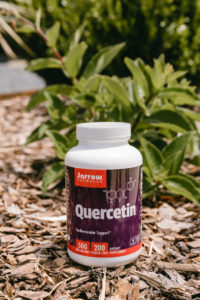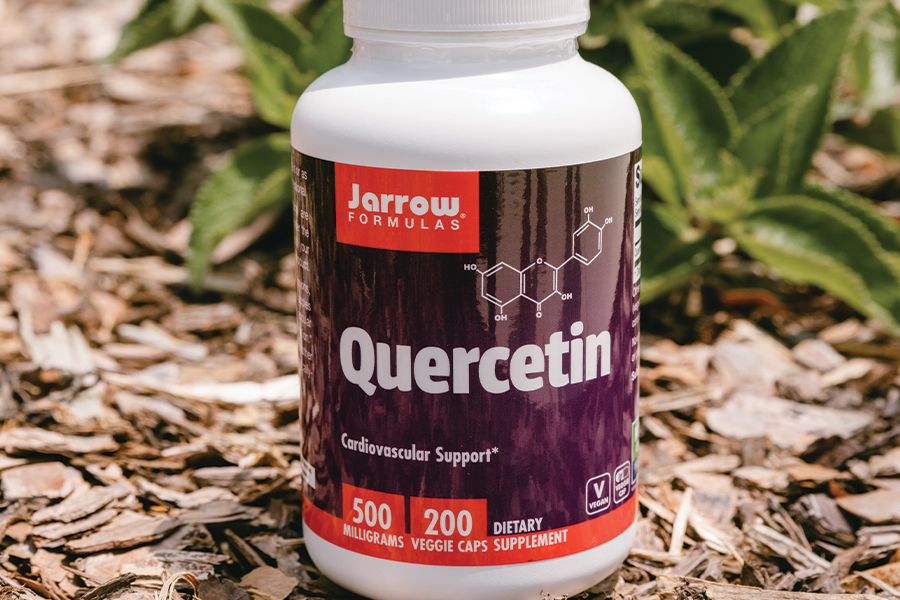In recent years, there has been a tremendous surge in popularity for supplements with certain naturally occurring chemical compounds. While examples such as Coenzyme Q10 (CoQ10), turmeric, and curcumin come to mind, the clear frontrunner in popularity and sales is a plant pigment (flavonoid) called quercetin.
But what exactly is quercetin, and what do we know about it? What benefits can be realized from taking quercetin? More importantly, is it safe? What are the potential side effects, if any? In today’s article, we’ll explore all of these questions and more. By the end, you’ll have all of the information you need to make an informed decision on whether or not you should consider adding quercetin to your daily wellness regimen.
What is quercetin?
Quercetin is a plant pigment, also referred to as a “flavonoid.” Flavonoids are a specific group of primary plant metabolites, or simply put, chemicals found in a plant that are necessary for maintaining the plant’s normal metabolic process. In fact, it is so common that it is found in low doses within many foods that you may consume on a regular basis. Foods such as broccoli, onions, grapes, berries, and citrus fruits, all contain quercetin.
What are the health benefits of taking quercetin?
Quercetin as an Antioxidant
In order to fully appreciate quercetin’s health benefits, we need to establish a basic understanding of the body, and how it works. As we age, the two greatest internal threats to enjoying a long, healthy life are oxidative stress and inflammation. When oxygen is processed by the body, it splits into single atoms, each with an odd number of electrons. Since electrons are only stable when in pairs, these unstable oxygen atoms race through the bloodstream looking for other atoms with an unpaired electron. This leaves a trail of destruction and inflammation in their wake, damaging proteins, cells, tissue, and DNA in the process.
These destructive oxygen atoms are commonly referred to as free radicals and controlling these free radicals is the work of antioxidants. Antioxidants track down the free radicals within the body and share an electron with the rogue oxygen atoms, thereby stabilizing them and mitigating their reign of terror. Because quercetin is so robust with antioxidants, it brings tremendous value in helping to control free radicals and helping to prevent the damage they can cause.
An imbalanced system with too many unchecked free radicals can result in oxidative stress, which may lead to a variety of diseases and ailments, including cancer, arthritis, aging, autoimmune disorders, cardiovascular and neurodegenerative diseases, and diabetes.
Research shows that high levels of free radicals may help to activate genes that promote inflammation. Thus, high levels of free radicals may lead to an increased inflammatory response. While a little inflammation is necessary to help your body heal and fight infections, persistent inflammation is linked to health problems, including certain cancers, as well as heart and kidney disease.
In test-tube studies, quercetin reduced markers of inflammation in human cells including the molecules tumor necrosis factor alpha (TNFα) and interleukin-6. In a study published by the Journal of the American College of Nutrition that involved women with rheumatoid arthritis, it was found that participants who took 500 mg of quercetin experienced significantly reduced early morning stiffness, morning pain, and after-activity pain. They also had reduced markers of inflammation, such as TNFα, compared to those who received a placebo.

Quercetin as an Anti-Inflammatory
Generally speaking, inflammation is not ideal for the body but at certain times, inflammation is useful and necessary. When the body is fighting a virus for instance, inflammation is caused at the cellular level by components of the immune system to act as a marker and signaling the location of cells affected by the virus. This allows other immune system agents to identify the troubled cells to prevent the attack of healthy cells. In most cases, inflammation in the body is caused by oxidative stress from free radicals or fluids excreted from white blood cells flooding into soft tissue that’s been damaged or strained. In addition to its antioxidant properties, quercetin displays powerful effects as an anti-inflammatory agent. Reducing inflammation benefits the body in numerous ways, including controlling blood sugar, causing apoptosis (cell death) in cancer cells, and preventing heart disease.
Does Quercetin Help Fight Allergies?
Some studies suggest that quercetin may also provide allergy symptom relief. Test-tube and animal studies from the National Institutes of Health found that quercetin may block enzymes involved in inflammation and suppress inflammation-promoting chemicals, such as histamine. For example, one study showed that taking quercetin supplements suppressed peanut-related anaphylactic reactions in mice. Note that further research is necessary to determine whether the compound has the same effect on allergies in humans.
Does Quercetin Help Fight Cancer?
Because quercetin has antioxidant properties, it quite possibly may have cancer-fighting properties as well. In a review of test-tube and animal studies, quercetin was found to suppress cancer cell growth and induce cell death in prostate cancer cells. Other test-tube and animal studies observed that the compound had similar effects in the liver, lung, breast, bladder, blood, colon, ovarian, lymphoid, and in adrenal cancer cells. While these findings seem promising, more research involving human studies are needed before quercetin can be recommended as an alternative treatment for cancer.
What Are the Side Effects of Quercetin?
Quercetin is not considered a dangerous compound and it is not a controlled substance. As previously stated, low doses of quercetin are commonly found in many of the foods we regularly eat. WebMD references a study showing that supplementing with 500mg of quercetin, twice daily for a 12-week period is deemed safe. Meanwhile, the study also states that it does NOT have enough substantial findings to support a safety claim for larger doses or prolonged usage. The most common side effects include headache, nausea, and tingling of the arms and legs.
Who Should Avoid Taking Quercetin Supplements?
Strictly from a cautionary perspective, quercetin is NOT recommended for use by pregnant women, women who may be pregnant, or by women planning to become pregnant. While there is no prevailing belief that suggests quercetin could be damaging or harmful to a developing fetus, more research is necessary to substantiate its safety of expectant mothers and their developing fetuses.
It is not recommended for people who are currently taking prescription medications to include quercetin supplements in their daily regimen, unless otherwise instructed by their physician. Prescription drugs are often broken down by various liver enzymes during digestion, reducing the amount of medication that actually makes it into the bloodstream. Quercetin has been proven to inhibit the abilities of three separate groups of liver enzymes to perform this vital metabolic function. There are literally dozens of commonly prescribed medications that these three enzyme groups help process. Do NOT take quercetin supplements without first consulting with your physician. Without determining how quercetin can affect your current medications, you may run the risk of getting too much of the medication into your system and risk increasing the side effects of those medications.
Who Should Take Quercetin?
In summary, research on quercetin demonstrates that the flavonoid supplement not only has powerful antioxidant properties, but has strong anti-inflammatory properties as well. It is thought to be safe in moderate doses for otherwise healthy people to take as a supplement a few months at a time. Given its antioxidant and anti-inflammatory effects, health-conscious people who aren’t taking prescription drugs may see tangible benefits from short-term quercetin supplementation.
As with any change to your wellness regimen, we at FarmersMarketWellness.com strongly recommend consulting with your physician prior to the addition of any new supplements to your daily health regimen.

